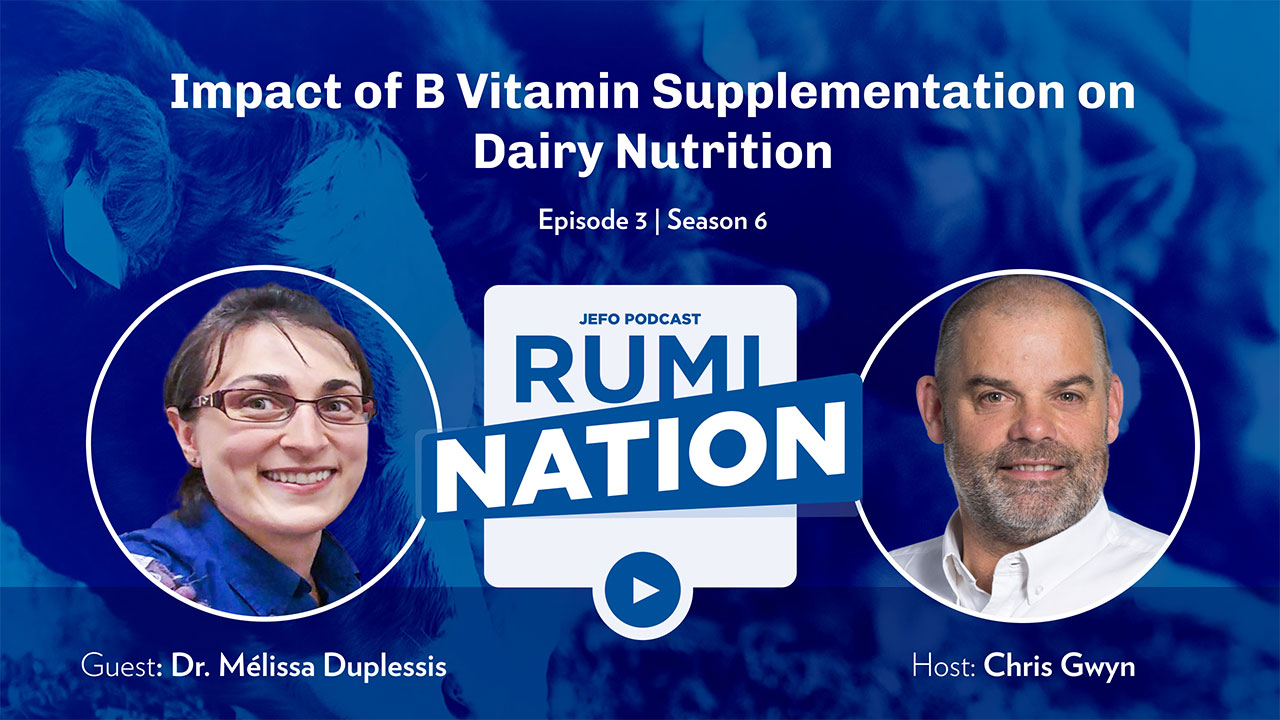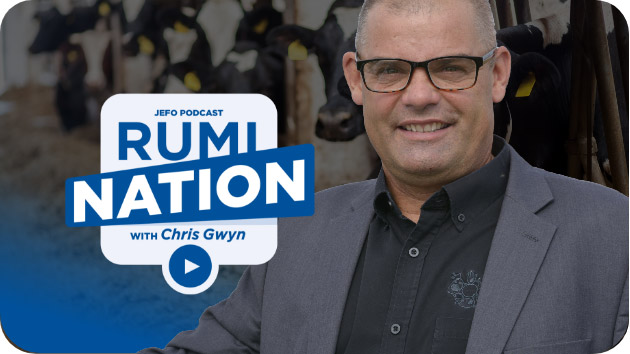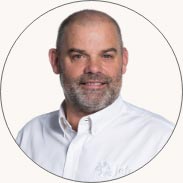RumiNation | S06 : E04
Breaking Barriers to Mental Health in Farming Communities
Brought to you by Jefo Nutrition
Share now!
Did you enjoy this episode?
Share now!
Our guest - Dr. Heather Schlesser
Heather Schlesser is an Agriculture Educator in Marathon and Clark Counties. She has a PhD in Reproductive Physiology and a master’s degree in Animal Breeding and Genetics. Before joining Extension, Heather worked as a high school agriculture instructor for three years. Since then, Heather’s research and outreach have focused on utilizing current technology to enhance farm profitability and sustainability, as well as addressing farm succession and stress, milk quality, and colostrum feeding.

Timestamps & Summary
Chris Gwyn (01:51)
Dr. Schlesser, you recently published a study titled Wisconsin Farmers Share Their Stressors and Mental Health Care Needs Through Focus Groups. I was wondering if you could share the reasoning behind conducting the study.
Dr. Heather Schlesser
I think we all know that COVID was hard on everybody, whether you were on a farm or not on a farm. And one thing that we saw here in Wisconsin is that, with COVID, we had a spike in the number of suicides that were happening on farms. The CDC has even shown that between 2000 and 2020, there was an increase in the rate of suicides in rural areas by 46%. […] And our study team wanted to know: why were these farmers not seeking help? Why weren’t they reaching out to medical providers and getting assistance for the stress that they were feeling?
Chris Gwyn (02:55)
So you took a focus group approach to the study, and it’d be interesting to know: what were the key findings in the study?
Dr. Heather Schlesser
Interestingly, one of the main things they said is that they didn’t feel comfortable going to the providers because they didn’t have a farming background. They didn’t understand that farming isn’t just a job for these people; it is a way of life. You know, farmers identify as farmers. That is their whole entire life. It’s not just “I’m going to go to an 8-to-5 and come home and be something else”; they are farmers. […]
The other thing that they said was a major stressor for them is, “We’re already so busy on the farm doing the work that has to get done on a daily basis. We don’t have the time to take off, to clean up, to drive into town, and to go see somebody that doesn’t even understand what we’re going through.” […]
Another thing that came out that we saw is that there’s still that stigma: “We can’t go see a provider because then everybody else in town is going to see our truck in the parking lot, and they’re going to know that we need help.” […]
Chris Gwyn (04:58)
So what have you seen work in order to lower some of these barriers and stressors?
Dr. Heather Schlesser
I would say the biggest thing that has really helped has been due to COVID. We couldn’t meet in person with COVID, so they started Telehealth.
Telehealth has been a huge help because there’s no more getting changed. There’s no more taking a shower. You can’t tell if I smell — I might, but you can’t. There’s no truck in a parking lot that somebody is going to drive past and see. I don’t then have to make a 20-minute commute into town and then a 20-minute commute back. So, Telehealth has really helped farmers because it allows them to get past a little bit of that barrier of time. […]
Chris Gwyn (06:16)
Can you expand a bit on the Telehealth program?
Dr. Heather Schlesser
Before COVID, it wasn’t approved by a lot of insurance companies. In order to have a Telehealth visit, you had to go into the doctor’s office in order to get insurance to cover that. Now, because it was allowed during COVID to do Telehealth visits, they have continued that, and they’ve continued them not only for mental health… […]
Chris Gwyn (08:20)
What are some of the key must-dos when it comes to transitioning a farm business to another generation of owners?
Dr. Heather Schlesser
I would say that the biggest must-dos are that you need to develop a plan, then communicate that plan, implement the plan, and then evaluate if that plan is working. I think far too often we get hung up on transferring the cows, transferring the buildings, transferring the assets of that farm, and we forget that younger generations may not be doing all of the day-to-day, and they don’t have the knowledge that it takes. […]
It takes a lot of time. A lot of farms that I work with are like, “Okay, I’m getting out in two years.” And I’m like, “Did you start your plan five years ago?” […]
Chris Gwyn (10:34)
I’m wondering whether you’ve looked into observations that you can share about how stressors on families, employees, and ownership impact overall cow health and productivity.
Dr. Heather Schlesser
I don’t have any research to back it up, but I would say, just anecdotally, when we’re stressed out, we get angry sooner. Anything sort of triggers us faster. If I’m stressed and I’m pent up, they’re feeling that energy that I’ve got, the little vibrations that are going on in my body. But I’m also probably ruder. I think when I’m stressed at work, I can be a bear to be around. And so, if that cow isn’t moving as fast as I want it to, I’m going to get pushy. I might even smack it; I might yell at it a little bit more. If the calf isn’t drinking as much or as quickly as I want to, I’m shoving it down its throat. […]
Chris Gwyn (13:23)
Any other final comments you’d like to share with the audience?
Dr. Heather Schlesser
Just make sure you’re taking care of yourself, because if you don’t, nobody else will.






